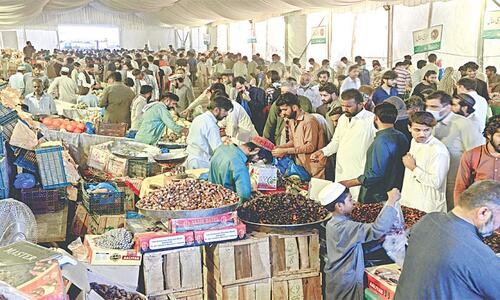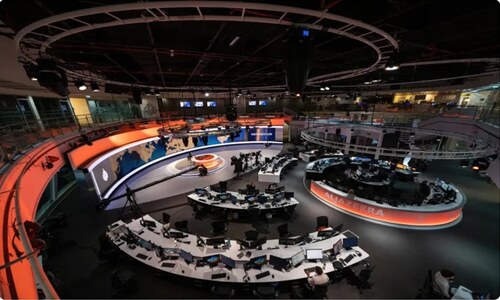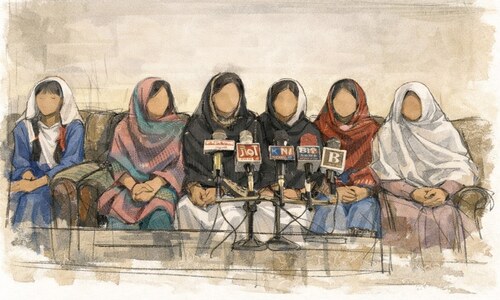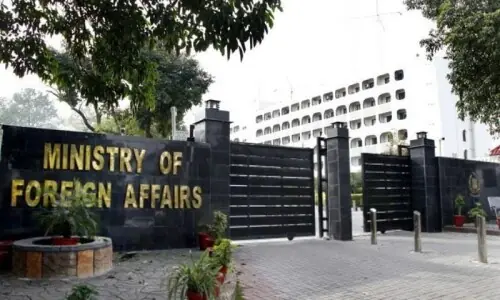In a world where belief and militancy are becoming fused, there are peaceful yet puritanical forms of religion that still capture peoples’ imagination. One such form is advanced by the Tablighi Jamaat (TJ), a worldwide Islamic missionary movement popularising the concept of inner reform among believers.
What makes TJ fascinating and relevant is its complete divorce from the politics of militancy. Instead, TJ focuses on being unassuming and austere. Instead of training guns at others, da’wah [invitation to the righteous path] encourages Muslims to train their thoughts on inner reform and spiritual cleansing.
Pakistan’s experience of the TJ centres around Raiwind, near Lahore, but the notion of da’wah pervades most of the Muslim world as well as countries that have a significant Muslim populace. In fact, TJ’s roots pre-date the partition of South Asia — perhaps this is why it manages to attract hundreds of thousands of devotees to their ijtima [congregation] every year in Raiwind, Nizamuddin (India) and Tongi (Bangladesh). Not only has TJ weathered many storms during the 90-plus years of its history, it remains one of the fastest-growing religious movements whose influence has been felt across this country and indeed elsewhere too.
What makes TJ fascinating and relevant is its complete divorce from the politics of militancy
Yet, the organisation, which observes the revivalist Deobandi school of thought, has faced bitter verbal clashes with rival Deobandi organisations and faced allegations of sheltering extremists in the aftermath of 9/11. Still, it has survived and none of these crises have deterred TJ volunteers around the world from the days, weeks and months they dedicate to da’wah work. But an emerging internal struggle might change that.
THE BIG DIVIDE

The Tablighi Jamaat presents itself as a selfless, apolitical, multi-ethnic entity — but from behind this reserved organisational character an internal schism is emerging, with two rival camps fighting for spiritual authority.
The conflict came out into the open recently in the United Kingdom, where TJ has a significant base. In December 2017, police had to be called in repeatedly to separate brawling adherents of the two camps, both of which wanted to lay claim to the Masjid-i-Ilyas, the Markaz or central office of TJ. Things got to such a point that the Markaz was shuttered by the authorities for two weeks to allow tempers to calm down. But the schism has only grown and taken on international dimensions.
One side of the conflict originates from Nizamuddin — the oldest Tablighi centre and the de facto headquarters of the movement in the Indian capital Delhi. Here you will find followers of Maulana Saad Kandhalvi, ameer or head of the TJ shura (advisory council). Maulana Saad Kandhalvi is the great-grandson of Maulana Muhammad Ilyas, the founder of the missionary movement and the grandson of its second ameer. Due to his relationship with the TJ founder and the second ameer, Maulana Saad is revered by many in Tablighi circles.
Read: Da’wah and Deoband: A brief history
The other camp resides in Raiwind, Pakistan — home of a sprawling complex which hosts an annual conference that attracts tens of thousands of Tablighi missionaries from all over the world. Some might say this is the rebel camp. Here, leaders have set up their 13-member advisory council, with a more international membership. Haji Abdul Wahab, ameer of Raiwind Shura and one of the senior-most members of TJ’s central leadership council, is the key figure in the Aalmi Shura, or the international advisory council. Raiwind used to be the largest gathering of Muslims outside of Haj but was overtaken by the Tongi jalsa in Bangladesh ever since foreigners became reluctant to visit Pakistan because of security reasons.
Differences between the two camps were simmering beneath the surface for a long time but these differences played out in public only recently. Emotions ran high in London, which is home to leaders and supporters of both factions, over what was deemed acceptable and what was deemed modern.
The sources of discontentment are many but going by the charge-sheet issued against him by Darul Uloom Deoband in their fatwa, Maulana Saad is accused of disrespecting the scholars and earlier prophets and putting forward “unacceptable” new interpretations of the concepts of the Quran and Sunnah.
Currently there are two TJs operating in London and in the rest of the UK. One adheres to the instructions from Nizamuddin in Delhi and Maulana Saad Kandhalvi and the other follows instructions from the Aalmi Shura centred in Raiwind. These differences were initially kept under wraps but later both factions launched Facebook pages to keep their supporters informed about the latest developments.
“Prophet Moses left his nation and went in seclusion to engage in munaajaat [conversation with the Almighty], due to which 188,000 individuals went astray,” Maulana Saad was quoted as saying in one of his speeches.
“To teach deen [religion] for a wage is to sell deen,” he is quoted as saying on another occasion. “People who commit zina [adultery] will enter jannah [paradise] before those who teach Quran for a wage.”
An audio clip of a mashwara or consultative meeting at Nizamuddin started doing the rounds among TJ circles where Maulana Saad is heard saying (to protestations): “I am the ameer ... the ameer of all ... if you do not agree, go to hell.”
It was basically due to these utterances that Maulana Saad’s opponents consider him unfit for the office of ameer saying he lacked the requisite ‘tarbiyyah’ (growth, development, loftiness).
Supporters of Maulana Saad say, however, that he wants to modernise the group by getting rid of some of the archaic practices having no roots in the Quran and Sunnah. “The elders are angry with Maulana Saad because he is trying to shake up Nizamuddin, which has been filled with a coterie of maulanas, who have vested interest in following the old path,” one of Maulana Saad’s supporters was quoted as saying at an event in London.
They mention his preference for Muntakhab Ahadith (selected sayings of Prophet Muhammad, PBUH) by Maulana Muhammad Yusuf — his grandfather — against Fazail-e-Amaal by Maulana Zikraya as the core reading material during missionary work. They also mention the new mannerism he introduced to greet the newcomers in the name of daawat, taaleem and istaqbal (preaching, education and welcome).
It was on the basis of these issues that Maulana Saad’s leadership grew ever-more contentious over time. Now TJ is divided into two camps — one supporting Maulana Saad and the other supporting Maulana Mohammad Zuhairul Hasan, son of the late Maulana Zubairul Hasan. Followers, friends and well-wishers of TJ are said to be very anxious over this adverse situation at their world headquarter.
In Nizamuddin, the rift took an extremely serious turn in June 2016, when one group of supporters attacked their opponents with lethal weapons following an argument over a prayer mat. Some 15 people were reportedly injured, and the police had to be brought in to calm things down.
In the face of death threats and vandalism, the senior members of the Shura started leaving Nizamuddin Markaz. There are two centres of activities for TJ volunteers in India — one at Nizamuddin in Delhi and another in Bhopal — and many of the Shura members moved to Bhopal to escape the conflict at Nizamuddin.
Because of the ethnicity of the leadership of the rival factions and their followers, the fracas at Nizamuddin seemed to have become a Gujaratis versus Maharashtris conflict.
The remedy for this situation was proposed from Pakistan. In November 2015, at the Raiwind annual congregation, senior members of the movement from around the world decided to reconstitute the world shura, and named 13 members to the council including Maulana Saad and Haji Abdul Wahab, ameer of the Raiwind Shura. This provided a platform to the opponents of Maulana Saad in Nizamuddin and elsewhere in the world.
Most importantly, the meeting in Raiwind “emphatically resolved to continue its business on the shura [consultative] system only and negated a particular ameer or leader for the future.” Maulana Saad rejected these resolutions and refused to sign the document.
DUEL IN LONDON

Perhaps unsurprisingly, the division in this global movement has global ramifications — including in the UK.
According to a TJ activist, it all started with a visit of two representatives of the International Shura to the UK, in September 2017 to gather signatures and support for the Aalmi Shura. They went to various TJ centres to meet volunteers and leaders.
This visit divided the TJ volunteers and elders on the basis of nationalities or the countries of origin. Those from the Gujarati community and most of those having a Pakistani background sided with the Aalmi Shura, while most volunteers and elders with a Bengali background stood behind Maulana Saad.
Before the delegation left Britain, the lines were already drawn, dividing the TJ community into two camps. Of the seven TJ centres in the UK, three — Blackburn, Leicester and Glasgow — expressed loyalties to the Aalmi Shura while three others — Birmingham, Bristol and Dewsbury — stood solidly behind Nizamuddin.
The situation in the seventh centre, London, took an ugly turn when three members of the London Shura signed a letter of support for the Aalmi Shura without consulting the London Shura or any of its 10 subordinate circles. This prompted the ameer of the London Shura to expel them from the London set-up and fill the vacant positions by other volunteers, including his son.
This led to disturbances in a shura meeting at the London Markaz, or Masjid-i-Ilyas, in December 2017. A heated exchange was followed by a physical brawl between the supporters of rival factions inside the centre. The London Metropolitan Police had to intervene and the centre was closed for around two weeks.
It was not the first time that the police had to be called in to calm emotions and separate the supporters of warring factions. Some reports suggested that police visited the site over a dozen times to attend to ugly situations. Supporters of the Aalmi Shura led by three dissident members of the London Shura later took control of the London Markaz and deployed security guards to scrutinise the entry of worshippers into the mosque when it was re-opened after two weeks.
Supporters of Maulana Saad, led by the London ameer, in the meanwhile, moved their activities to the old London Markaz at Christian Street in the Tower Hamlet area dominated by Muslims of Bangladeshi origin, where they meet on Tuesdays for consultations and on Thursdays for tashkeel [formation of groups] and da’wah routes.
Currently there are two TJs operating in London and in the rest of the UK. One adheres to the instructions from Nizamuddin and Maulana Saad and the other follows instructions from the Aalmi Shura centred in Raiwind.
These differences were initially kept under wraps but, later, both factions launched Facebook pages to keep their supporters informed about the latest developments.
“This notice in Dewsbury Markaz was put up to establish the Nizamuddin authority after the recent confusions,” says a post on London on the Nizamuddin Facebook page. “Alhamdulillah our Markaz in Dewsbury UK are [sic] under the tarteeb [organisation] and follow the guidelines of Nizamuddin World Markaz. This post is to clarify that [the] majority of UK [sic] continue [sic] to follow and will continue to follow the guidelines of Nizamuddin. It is only a very small minority, a fraction of people who have diverted.”
Another post on the pro-Saad page quotes a sermon delivered by a cleric in Maryland, US: “For the past 100 years, the decision of da’wah and tabligh [proselytization] was made only in Nizamuddin World Markaz. No one asked a single question. This is how the effort has been running, it always stayed there and it never went elsewhere. [Maulana] Saad’s imaarath [office of an ameer] was decided 20 years ago. This new concept of Shura is bogus, this is not a reality, this has no basis in the effort. It has always been that our Markaz has always been Markaz Nizamuddin in New Delhi.”
Meanwhile, the anti-Saad camp has also not been left behind in their use for social media to spread their message.
“When [a] delegation from Nizamuddin [was visiting] Madarsa Mazahir-ul-Uloom, all the students boycotted and refused to attend any event in the empty Masjid,” says a post on the anti-Saad Facebook page along two pictures of what looks like a parking area. “Urgently [sic] Saad Kandhalvi’s local group managed to import some persons from outside, and the evidence is these two pics where vehicles can be seen in [the parking lot].”
Another post accompanied by a graphic with Urdu text conveys the following message:
“Sometimes small kids didn’t [sic] able to understand and raised question that did Deoband supporting [sic] Aalami Shura? ANSWER: No, the actual fact was Aalami Shura is following & supporting Deoband instructions, because train engine doesn’t required [sic] anything to run but in fact buggies required [sic] engine.”
So the question is why is this issue so important?
Some may call it Nizamuddin versus Raiwind while others take it as Nizamuddin versus rebels. There is also the individual versus collective decision-making dimension in the controversy as there is the modernist versus conservative undertone. But it all comes down to who should provide the spiritual leadership for TJ when it needs it the most. After all, it is an organisation where even for a smaller group, there are responsibilities for even the smallest of tasks such as running the group at a particular mosque that particular night. So is it prudent to leave a vacuum at the top?
DARUL ULOOM DEOBAND BAN

In December 2016, the Darul Uloom Deoband issued a fatwa that probably stands as the strongest indictment of Maulana Saad’s leadership, painting it as both deviant and divisive: “Due to a lack of knowledge, [Maulana Saad] has strayed from the path of the majority of the Ulema ... in his ideologies and his explanation of Quran and Hadith, which is undoubtedly the path of deviation,” the statement said.
Maulana Saad’s tendency to let his mouth run at times was often discussed within the movement. Those who heard his contentious remarks would not know if they were more than isolated, off-the-cuff remarks. The Deoband fatwa, by listing seven offensive remarks that were investigated and proved to have been made by him, would have greatly damaged his standing, given the source.
In 2017, the Islamic seminary went one step further and issued an order banning TJ from its campus. Restricting the group from conducting any activities inside the “four walls” of the sprawling madressah, the seminary’s administration announced, in August 2017, that any student found involved in Tablighi activity would face punitive action. This is the first time in the seminary’s over-100-years-old history that it has shut its doors on the Tablighi Jamaat, its own ideological offshoot.
The action, said the seminary’s rector Mufti Abul Qasim Nomani, was needed to prevent a clash among Deoband students who were getting divided into two camps. “We are not against Tablighi Jamaat or its works but were only worried that our students might get sucked into the fight between the two factions,” Mufti Nomani was quoted as saying in the Indian media. “We tried to mediate between the groups to help them sort out their differences but failed. The ban will be lifted only after the two factions bury their differences.”
In the latest development, Maulana Saad is reported to have admitted to a ‘mistake’ while confined at the Kakrail Mosque (another designated markaz for the movement). Barred from attending the congregation in Tongi, perhaps Maulana Saad may finally repent and correct his ‘mistake’. Darul Uloom Deoband has expressed satisfaction on the reports of repentance and admission of making mistakes by Maulana Saad but has said that it couldn’t ignore the intellectual waywardness which was the basis of Darul Uloom Deoband’s original pronouncement.
A VACUUM OF LEGITIMACY
The split in TJ has greatly frustrated some lifelong devotees worldwide and a London-based volunteer sums it up really well.
“There are those who follow Nizamuddin and Maulana Saad Kandhalvi and then there are others opposed to him, hence following Aalmi Shura. But there is a third camp, comprising people like me, who are confused at the state of affairs,” he says.
It is a fact that the outcome of the current struggle will decide the future direction for the missionary group — whether it marches ahead on the road to personal piety or remains wedded to its archaic ways and customs having no foundations in religious literature, whether it develops into an all-inclusive group where decisions are made through consultations or orders are imposed from the top leadership decided on the basis of bloodline.
The writer is a former Dawn staffer
Published in Dawn, EOS, February 25th, 2018


































